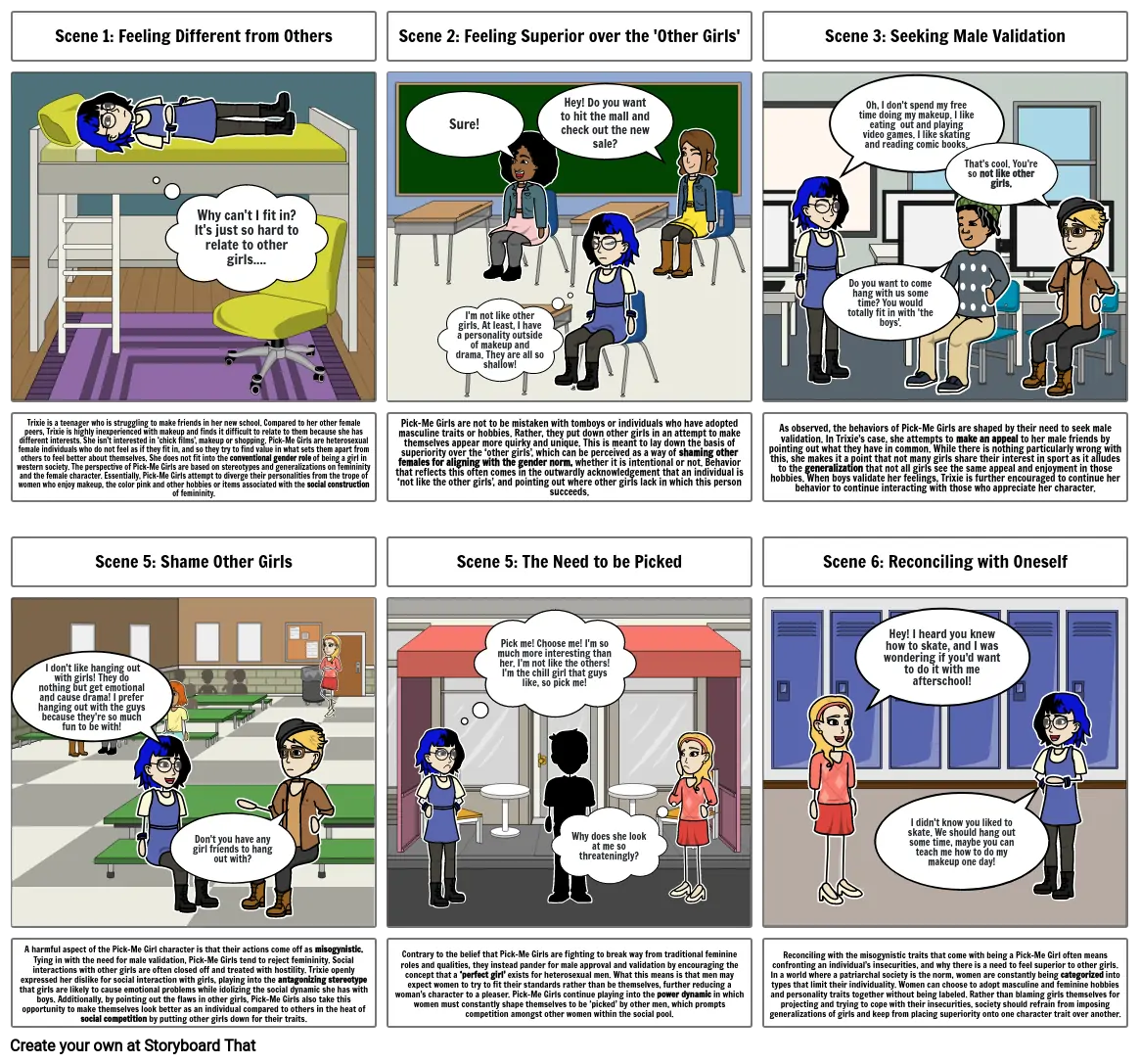The Dissection of a Pick-Me Girl (A Modern Take on Internalized Misogyny)

Storyboard-Text
- Scene 1: Feeling Different from Others
- Why can't I fit in? It's just so hard to relate to other girls....
- Scene 2: Feeling Superior over the 'Other Girls'
- Sure!
- I'm not like other girls. At least, I have a personality outside of makeup and drama. They are all so shallow!
- Hey! Do you want to hit the mall and check out the new sale?
- Scene 3: Seeking Male Validation
- Do you want to come hang with us some time? You would totally fit in with 'the boys'.
- Oh, I don't spend my free time doing my makeup. I like eating out and playing video games. I like skating and reading comic books.
- That's cool. You're so not like other girls.
- I don't like hanging out with girls! They do nothing but get emotional and cause drama! I prefer hanging out with the guys because they're so much fun to be with!
- Trixie is a teenager who is struggling to make friends in her new school. Compared to her other female peers, Trixie is highly inexperienced with makeup and finds it difficult to relate to them because she has different interests. She isn’t interested in ‘chick films’, makeup or shopping. Pick-Me Girls are heterosexual female individuals who do not feel as if they fit in, and so they try to find value in what sets them apart from others to feel better about themselves. She does not fit into the conventional gender role of being a girl in western society. The perspective of Pick-Me Girls are based on stereotypes and generalizations on femininity and the female character. Essentially, Pick-Me Girls attempt to diverge their personalities from the trope of women who enjoy makeup, the color pink and other hobbies or items associated with the social construction of femininity.
- Scene 5: Shame Other Girls
- Pick-Me Girls are not to be mistaken with tomboys or individuals who have adopted masculine traits or hobbies. Rather, they put down other girls in an attempt to make themselves appear more quirky and unique. This is meant to lay down the basis of superiority over the ‘other girls’, which can be perceived as a way of shaming other females for aligning with the gender norm, whether it is intentional or not. Behavior that reflects this often comes in the outwardly acknowledgement that an individual is ‘not like the other girls’, and pointing out where other girls lack in which this person succeeds.
- Scene 5: The Need to be Picked
- Pick me! Choose me! I'm so much more interesting than her. I'm not like the others! I'm the chill girl that guys like, so pick me!
- As observed, the behaviors of Pick-Me Girls are shaped by their need to seek male validation. In Trixie’s case, she attempts to make an appeal to her male friends by pointing out what they have in common. While there is nothing particularly wrong with this, she makes it a point that not many girls share their interest in sport as it alludes to the generalization that not all girls see the same appeal and enjoyment in those hobbies. When boys validate her feelings, Trixie is further encouraged to continue her behavior to continue interacting with those who appreciate her character.
- Scene 6: Reconciling with Oneself
- Hey! I heard you knew how to skate, and I was wondering if you'd want to do it with me afterschool!
- A harmful aspect of the Pick-Me Girl character is that their actions come off as misogynistic. Tying in with the need for male validation, Pick-Me Girls tend to reject femininity. Social interactions with other girls are often closed off and treated with hostility. Trixie openly expressed her dislike for social interaction with girls, playing into the antagonizing stereotype that girls are likely to cause emotional problems while idolizing the social dynamic she has with boys. Additionally, by pointing out the flaws in other girls, Pick-Me Girls also take this opportunity to make themselves look better as an individual compared to others in the heat of social competition by putting other girls down for their traits.
- Don't you have any girl friends to hang out with?
- Contrary to the belief that Pick-Me Girls are fighting to break way from traditional feminine roles and qualities, they instead pander for male approval and validation by encouraging the concept that a ‘perfect girl’ exists for heterosexual men. What this means is that men may expect women to try to fit their standards rather than be themselves, further reducing a woman’s character to a pleaser. Pick-Me Girls continue playing into the power dynamic in which women must constantly shape themselves to be ‘picked’ by other men, which prompts competition amongst other women within the social pool.
- Why does she look at me so threateningly?
- Reconciling with the misogynistic traits that come with being a Pick-Me Girl often means confronting an individual’s insecurities, and why there is a need to feel superior to other girls. In a world where a patriarchal society is the norm, women are constantly being categorized into types that limit their individuality. Women can choose to adopt masculine and feminine hobbies and personality traits together without being labeled. Rather than blaming girls themselves for projecting and trying to cope with their insecurities, society should refrain from imposing generalizations of girls and keep from placing superiority onto one character trait over another.
- I didn't know you liked to skate. We should hang out some time, maybe you can teach me how to do my makeup one day!
Über 30 Millionen erstellte Storyboards

